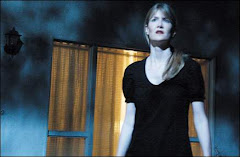
[The following essay was written about a year and a half ago--I was 18--and sheds light on cultural affinity of Japan's culture and cinematic scene. I recognize that the essay appears a bit intrinsic in its observation of these relationships, yet I've attempted to let the essay to remain rather intact because it does at the very lest provide a substantial overview. Within the next week or so I'm seeking to append additional references and evidence towards the observations.]
There is a scene midway into Yasujiro Ozu’s Tokyo Story where the elderly couple, who have been recently visiting their children for the weekend in Tokyo, spend the day at a coastal spa. It is conveyed throughout the film that the children’s parents signify a great burden for them, and the particular spa visit, arranged by the preoccupied offspring, allows for couple to be looked after without interrupting the daily routine of the children’s “big city life”. The scene, like many others in the film, emphasize a culture whose classical approach to cinema -- and all art forms – emphasizes an emotional and thematic texture that is both distinct and effective.
Late film director Yasuzo Masumura explains, “Sentiment in Japanese films means restraint, harmony, resignation, sorrow, defeat, and escape," not "dynamic vitality, conflicts, struggle, pleasure, victory, and pursuit.” Ultimately, this serves as a contrast to the typicality of Hollywood’s penchant for excessiveness, gratification, and fully-realized desire; and as Masamura further clarifies, “There is no such thing as a non-restricted desire. A person who thoroughly reveals his or her desire can only be considered mad....” [1]
So is Japanese cinema, in comparison to other countries’, limited in the light of their emotional constraints? It’s a yes and no answer. Certainly, the average “light drama” tends to not have the emotional fluctuations as the typical Amerian drama; the understated acting in Japanese films seems quite unnatural next to the convulsive, extroverted performances churned out by Hollywood each year. However, just as Masamura defines, the restrained emotions that are at the heart of Japanese dramas tend to be more individualistic and intimate than most other film cultures around the globe. In Grave of the Fireflies, the horrors of the Second World War are portrayed through the personal struggles of the film’s two young siblings, their survival amidst the destruction of the Japanese. There is a tragic level of inconsequentiality in relation to the conflict; the brother and sister meet their own death in a way that underlines the Japanese’s own hopeless defeat in the war.

Although Japan’s loss in the war generated a considerable amount of films expressing such a defeat, familial dramas have always been the quintessential example of traditionalism and restraint. Ozu, Shinoda, Nomura, Mizoguchi, Kurosawa and many other world-renowned Japanese masters often depicted their culture through the joys and misfortunes domestic interactions. Yoshitaro Nomura’s Kichiku tells of a wife’s desertion of her spouse and three kids after her husband fails to provide sufficient financial support for the family. Kenji Mizogucho’s Ugetsu shares a similar presence: the husband of a family in dire need of money to support his family is tempted by greed and consequently allows his wife and child to suffer. A noted perception of dramatic revelations within these pieces is that the individuals who often act on self-indulgence suffer at the fate of others, specifically loved ones. This emphasizes a traditionalistic notion of Japanese culture that self-preservation is one of the worst of sins; a straying on unity and collectivism exposes an unforgivable selfishness.
Analysis of world cinemas uncovers the cultures behind the lenses, but as the medium morphs and expands so to does the abilities for directors to convey those cultures. Anime, much like most cinematic movements, flourished under significant movements within the Japanese society. The genre permitted artists to express their frustrations with exponential progression within the economy and culture as well as the departure of traditionalistic values within the culture. Cinema, specifically classical Japanese, demonstrates that there is a necessary establishment for history, contemplation, anthropology, and so many more social sciences. One can only hope that somebody wouldn’t cast their parents to a day spa during their visit. The least one could do is go with them.




No comments:
Post a Comment